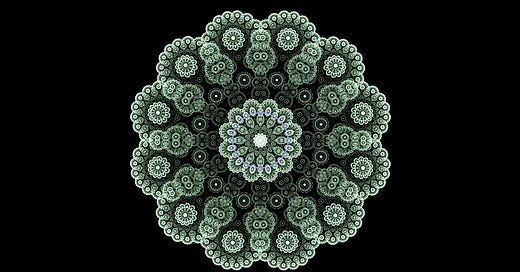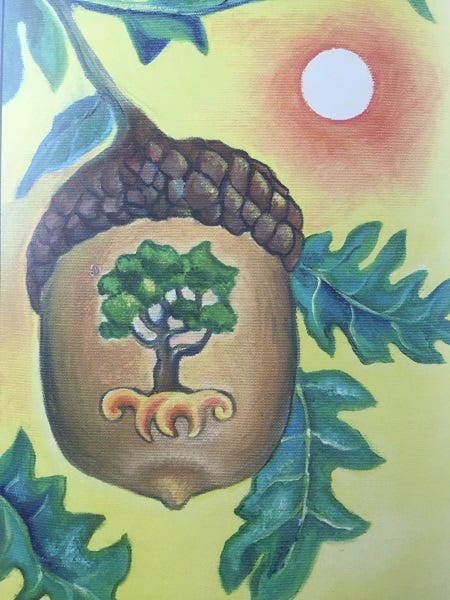When I was 15-years-old I met my best friend Carrie. She was nine years older than me and lived in the mother-in-law's apartment in the basement of the house of a mutual friend. Carrie was the older sister I had dreamed of and desperately needed all my life.
I was a pretty, traumatized girl with no recognition of either reality, which made me easy and attractive prey. Carrie taught me any number of useful skills to protect myself. From her, I learned to drink bourbon straight and roll my own joints, which she insisted would make me surprisingly intimidating and less prone to seeming such easy prey. She wasn’t wrong.
Neither of those lessons was lastingly useful to me, but others were. Carrie saw that I was whip-smart and hungry to make sense of the world, so she began to teach me about astrology. Specifically psychological astrology, which is a particular branch of modern astrology that approaches the individual birth chart as a map of each person’s psychological make-up and soul journey. Through psychological astrology, I was introduced to the idea of archetypes— universal ideas that wind their way through all our lives and tell us what larger story we’re living out, what aspects of the larger pattern we’re wrestling with as lifelong themes or at the present moment.
For me, as a Capricorn, the archetype of the Father sits at the center of my life. I can look at my history and see how issues around authority, discipline, guidance, and protection, all of which center around the greater idea of “father” in Western culture, have repeated over and over and over. I struggled mightily with my own Dad most of my life. When he died and I no longer had an actual, living person to occupy the “father” role in an imperfect, human way, pushing my emotional buttons, I could retract the tentacles of my projections and release my resentments. I could place him in a wider context.
My dad, like all of us, was a whole person, with gifts and challenges, on his own inexplicable soul journey. I wasn’t even present for decades of his life. I will never know all of the things he dreamed for himself or struggled with. Certainly, his position as my father was only a small piece of all of that mystery, and who I experienced him to be as a father had as much to do with who I am, the story I’m wrestling with, and the lessons I need to learn in this lifetime than anything else.
If forgiveness is releasing the desire for the past to be any different than what it was, then I found forgiveness for my father once he died. Our stories intersected in certain ways for a finite period of time, but both of us were living out much more complicated, rich stories and lives than just our relationship to each other. Our stories, both together and apart, were and are part of much larger stories that repeat, develop, and evolve across all of human existence. We experienced them as personal, but they also transcend us, are archetypal.
More recently, I’ve been working my way through a very painful break-up. Grief and anger are part of the process, but I’ve been struggling with feelings of contempt sitting on my heart. Contempt is a type of “othering” and destructive attachment that doesn’t feel integrous to me. Unpacking the astrology— his, mine, ours— is helping me remember that we all have stories we’re telling, archetypal themes we’re working through. Though our stories overlapped for a time, just like mine and my dad’s, his story isn’t mine and his journey to integrity with his story is for him to navigate. There were aspects of that story that I needed to learn things from for my own work, which I did, and now I can release it.
I mean, I’ve got shit to do in this life. I don’t have time to worry about other people’s work. Do you?
Integrity, Patterns, and Divination
If integrity is based on wholeness, then learning to see the fractal nature of reality is a useful tool in pursuing our integrity. What do I mean by the fractal nature of reality? Fractals are patterns that repeat over and over, building ever-larger patterns, but at every level of the fractal, the base pattern remains the same.

Nature is fractal. Think of how the veins of a leaf mimic the veins of a river system, or of the branches of veins moving through the human body. Look at how this picture of the cruciferous vegetable romanesco mimics the picture above.
There is a saying in Western esoteric thought, traced back to Hermes Trismegistus, “as above, so below”, which is an apt description of the fractal nature of the world, of which we are another natural part. Why wouldn’t our individual lives, both internally and externally, also be part of the larger patterns of the world in which we live, in the same way every acorn contains the entire oak tree that will grow from it, as well as the potential for every oak tree that comes after?
Every seed holds the whole. The universe does not deal in partial things.
People across all time have created symbol systems to try and divine these fractal patterns— astrology, tarot, I Ching, runes, tea leaves, and on and on and on. Our mechanistic, post-Industrial Revolution reality rejects these practices as superstition, but increasingly science is uncovering the fractal and interconnected reality of existence for which they provide symbolic language.
If you are interested in developing a divination practice to aid you in your integrity journey, here are some resources:
Astrology
I follow the work of Rob Brezsny, Chani Nicholas, and Katie Sweetman. If you want to dive deeper, check out the books of Liz Greene and Howard Sasportas. I was just re-reading for the umpteenth time Greene’s book, Astrology For Lovers. Despite the horrendous title, binary nature of the gender descriptions, and heterosexism (full disclosure), it’s a really useful, comprehensive overview of the four elements and twelve astrological signs— their general manifestations, mythology, and shadows.
I Ching
I have only minimally studied the traditional Chinese I Ching, but I did spend quite a bit of time studying the Toltec I Ching, with the author, William Douglas Horden, and illustrator, Martha Ramirez-Oropeza. The thing I love about the Toltec I Ching is the way it illuminates the fractal correspondences between Chinese philosophy and Toltec philosophy.
Martha, a renowned muralist, and her family come from the Toltec region of Mexico. William, married for many decades to Martha’s sister, lived and studied with shamans there after having studied traditional I Ching for years.
Tarot
I’ve never studied a general tarot guide in my life, though there are plenty out there. The deck I’ve used for decades is the Alchemical Tarot, which comes with a beautiful guidebook. I like it because it pulls in the symbolism of the alchemical process, which has so much to offer us around the nature of transformation and deep psychological work.
If you want to dive deeper into psychology and alchemy, read Psychology and Alchemy by Carl Jung.
Do you have a divination practice or study any symbol systems? How does it help your process towards integrity?
We have reached nearly 300 subscribers! Welcome to all of you new folks, and thank you to everyone for supporting my work.
I’d love to get to 300 before the end of June. Can you share this post, or one of your previous favorites, with someone in your networks and encourage them to subscribe? Or post a link on one of your social media channels with an endorsement? This is a grassroots, crowd-disbursed effort over here and I am grateful for your help. XO, Asha






This is the first post I read from your newsletter, but I will return soon for more. I am on a personal journey trying to make out the overall pattern from the fragments - I loved your images. Thank you for sharing your insights!
I too, while grieving, have been looking at patterns and archetypes, but I did not expand it as far as you have. It is comforting to see how it interconnects and relates on such a grand scale. Interesting.